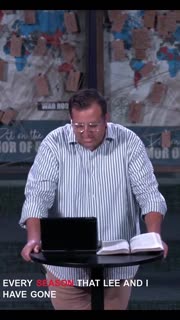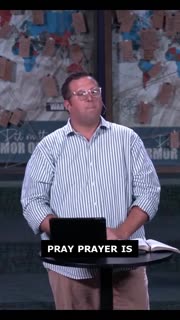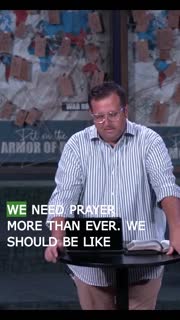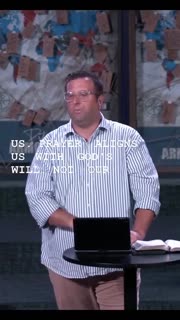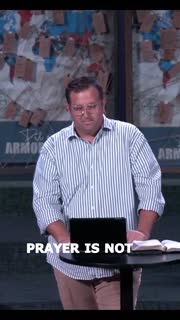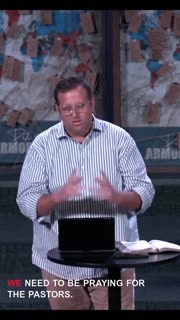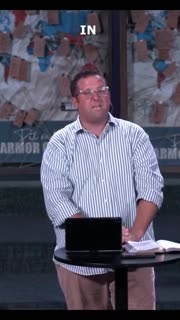Prayer: Our Spiritual Battleground and First Line of Defense
Devotional
Sermon Summary
Bible Study Guide
Sermon Clips
1. "You and I need to be on our knees fighting every day. We need to have a place where we are going to fight. Whether it's going and whether it's sitting down or kneeling down with the word of God and just fighting. Just praying. Just praying." [01:23] (20 seconds)
2. "Every season that Lee and I have gone through, we have found and leaned on the Lord. And Lee and I learned to change our prayers and go deeper and further in our prayers. We learned how to pray deeper because of the events in our lives." [08:51] (17 seconds)
3. "The more we pray and live in prayer, the closer we get to God and the farther we get from this world. So the question that we're answering is this. What is prayer? What is prayer?" [10:00] (18 seconds)
4. "When we pray, prayer is communication with God. It's a two-way conversation and not a one-way conversation. So when we look at Nehemiah 1:4-7, we're going to look towards Nehemiah for a perspective on prayer on how to pray in 2024 today." [12:43] (19 seconds)
5. "We need prayer more than ever. We should be like Nehemiah weeping. Weeping because we have seen guards, walls, and the list goes on of things that have fallen. And made believers in America defenseless. Though it may seem that we are. We are defenseless. We are anything but defenseless." [17:23] (26 seconds)
6. "Prayer aligns us with God's will. Not our agenda. Not our goals. Not our advancements. Nothing about us. It aligns us up with God and his plan and his agenda." [20:10] (13 seconds)
7. "Prayer is not about you coming and making prayer all about you. Your health. Your safety. And your life. Though it is easy to pray for these things. Instead prayer is a two-way avenue for you and I. We have to hear God's will. We have to experience God." [20:58] (16 seconds)
8. "We need to be praying for the pastors. The missionaries. And every believer. That we will walk with God and seek God. And that God will be our main priority." [35:55] (11 seconds)
9. "Because in Nehemiah we see that we have access to God. We see that we. That prayer is not about us. But it is about God. So here's our response this morning. May we reflect on shifting our prayer life. To seek God's will. And not our will." [36:32] (22 seconds)
10. "There are battles. Happening in this world every day. And you and I need to fight on our knees. We need to fight on our bedsides. We need to fight in our prayer chair. Whatever it is. We need to be praying and seeking God. And seeking his will." [37:50] (17 seconds)
Ask a question about this sermon
2. "Every season that Lee and I have gone through, we have found and leaned on the Lord. And Lee and I learned to change our prayers and go deeper and further in our prayers. We learned how to pray deeper because of the events in our lives." [08:51] (17 seconds)
3. "The more we pray and live in prayer, the closer we get to God and the farther we get from this world. So the question that we're answering is this. What is prayer? What is prayer?" [10:00] (18 seconds)
4. "When we pray, prayer is communication with God. It's a two-way conversation and not a one-way conversation. So when we look at Nehemiah 1:4-7, we're going to look towards Nehemiah for a perspective on prayer on how to pray in 2024 today." [12:43] (19 seconds)
5. "We need prayer more than ever. We should be like Nehemiah weeping. Weeping because we have seen guards, walls, and the list goes on of things that have fallen. And made believers in America defenseless. Though it may seem that we are. We are defenseless. We are anything but defenseless." [17:23] (26 seconds)
6. "Prayer aligns us with God's will. Not our agenda. Not our goals. Not our advancements. Nothing about us. It aligns us up with God and his plan and his agenda." [20:10] (13 seconds)
7. "Prayer is not about you coming and making prayer all about you. Your health. Your safety. And your life. Though it is easy to pray for these things. Instead prayer is a two-way avenue for you and I. We have to hear God's will. We have to experience God." [20:58] (16 seconds)
8. "We need to be praying for the pastors. The missionaries. And every believer. That we will walk with God and seek God. And that God will be our main priority." [35:55] (11 seconds)
9. "Because in Nehemiah we see that we have access to God. We see that we. That prayer is not about us. But it is about God. So here's our response this morning. May we reflect on shifting our prayer life. To seek God's will. And not our will." [36:32] (22 seconds)
10. "There are battles. Happening in this world every day. And you and I need to fight on our knees. We need to fight on our bedsides. We need to fight in our prayer chair. Whatever it is. We need to be praying and seeking God. And seeking his will." [37:50] (17 seconds)

